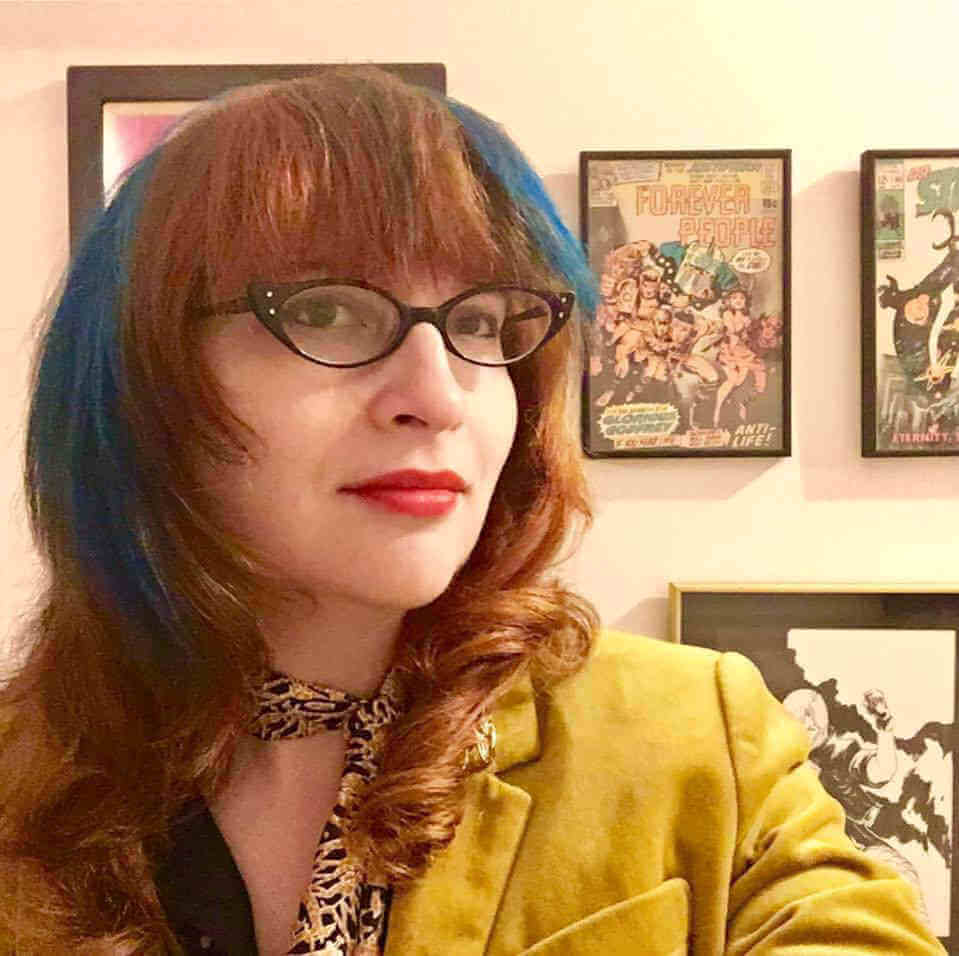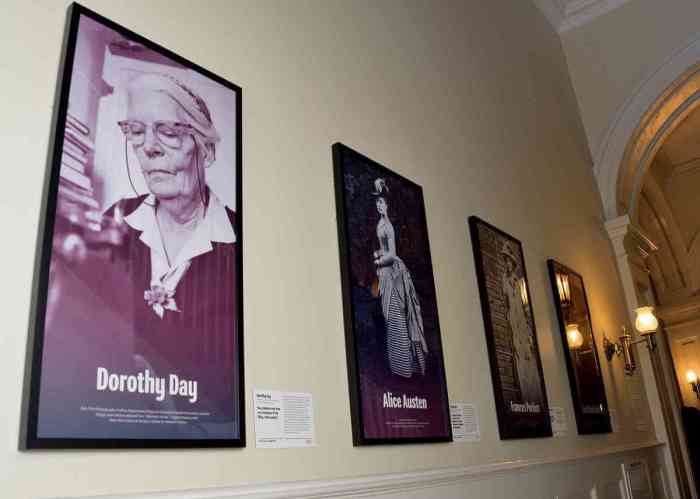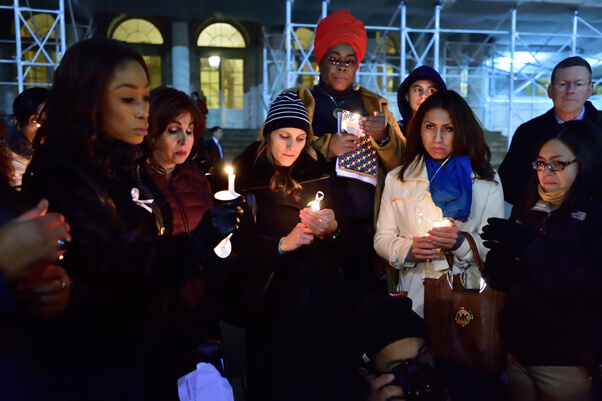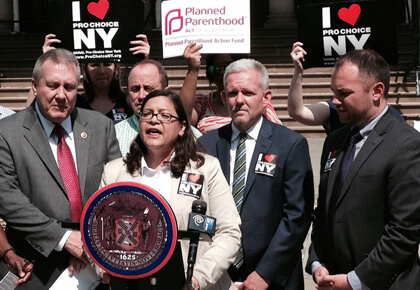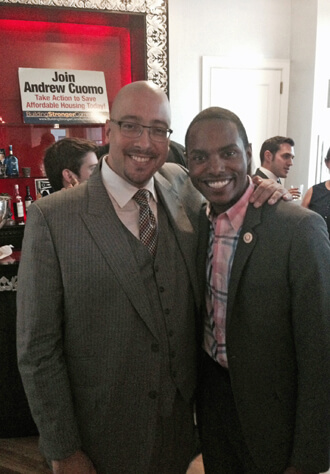From gamer, geek, and drag conventions to the political trenches to center stage on Broadway, LGBTQ fans as well as artists are using their abilities to advance progressive causes, shape the public conversation, and demand authentic depictions.
“Activism has been going on since the start of fandom,” said Elana Levin, program director at New Media Mentors and host of the Graphic Policy Radio Podcast.
Levin cited as a watershed moment when “forces came together to get ‘Star Trek: The Next Generation’ off the ground… It was a lot of women and LGBTQ fans demonstrating to the producers that there was an audience for the show, and that audience wanted to have female characters in more significant roles, and more diversity.” (That was 1987. Currently, “Star Trek: Discovery” has Wilson Cruz and Anthony Rapp as the first openly gay, partnered characters in franchise history.)
Present day actions, Levin noted, have “become about more than improving what we see and read. It’s about using the creativity we see in fandom to invent our own activism projects and spaces.”
Last year, Levin led “Fan Activists — Assemble! Using our Fabulous Powers to Win the Fight for Justice” at Flame Con, a comic convention that celebrates queer geekdom and LGBTQ contributions to pop culture. The training session, which challenged attendees to channel their cosplay, writing, drawing, and meme-making skills into activism, encouraged collaboration.
“Rather than go it alone,” Levin reasoned, “there are a lot of nonprofit organizations who work on issues these fans are concerned with. So it’s good when they can partner. Fans bring creativity and community, and don’t necessarily have the same approaches of people in the nonprofit world. And nonprofits have experience running campaigns.”
Recalling the development phase of a series adaptation of the “Iron Fist” comic, Levin cited an online petition from 18MillionRising.org, a community of South, Southeast, and East Asian diasporas, whose website notes their use of “digital-first advocacy tactics to elevate the voices of and mobilize our over 120,000 members to take action on issues that matter to them.”
“Their current executive director is trans,” Levin said, of Cayden Mak, “and they were able to connect with The Nerds of Color,” whose website describes them as a “community of fans who love superheroes, sci-fi, fantasy, and video games but are not afraid to look at nerd/ geek fandom with a culturally critical eye.”
They had this idea, Levin said, of, “‘Let’s do a petition to Marvel Studios/ Netflix before the show is made that they should cast an Asian.’”
A non-white Iron Fist, the petition argued, would “help remove some of the character’s more problematic elements such as Orientalism and cultural appropriation.”
By its premiere in March 2017, with a Caucasian in the title role, Levin noted, fans “completely changed the media coverage of the show,” by having their dissatisfaction with the casting become part of the mainstream press’ narrative.
At fan conventions, cosplaying attendees queer their interpretations of iconic comic, anime, and film characters (drag Wonder Women and trans Supergirls, for example), while panel discussions see content creators and pundits discussing LGBTQ inclusion and authenticity. Having a public forum for such matters wasn’t always the case, nor was having more than enough to talk about in a single sitting.
Charles Battersby, who has reported from Flame Con, Anime NYC, and Wigstock 2.HO for Gay City News, recalled, “About eight years ago, there was the occasional [LGBTQ-themed] panel at a gaming con. You’d have six people, and it would take you an hour to talk about every single gay storyline.”
In 2012, at Boston’s PAX East expo, Battersby curated and led “Press XY.”
“That was the first time,” they noted, “someone had done a panel just on trans themes.”
By 2017, Battersby said, the situation advanced to where a New York Comic Con panel addressed “woman and non-binary persons of color with mental illness in cosply. That’s such a hyperspecific set of subgroups in the community. And the reason a panel like that gets greenlit is if you have tens of thousands of people coming to the Javits Center in one day, if even one-tenth of a percent fall into that category, you’re going to have a room full of 50 people who are very excited about that issue.”
The 2018 New York Comic Con had its first-ever Queer Lounge, Battersby noted. Other cons, they said, “have a diversity lounge. And groups promoting race, disability, women’s and mental health issues might have a designated section that’s very prominently featured.”
When this was first proposed a few years ago, “A lot of people on the far left were outraged,” Battersby recalled. “They thought it would be a ‘petting zoo,’ and it ended up begin a huge success, done with a great deal of enthusiasm and earnestness.”
This new era of inclusion has yet to embrace one demographic, however.

“It seems,” Battersby said, “like the politics are almost always progressive. We don’t see a lot of conservative political panels at cons.”
Unabashed liberalism was the tone of “The Resistance,” a 2018 panel at the New York incarnation of RuPaul’s DragCon. Taking place just a few weeks before the midterm elections, it was presented by Swing Left, which seeks to elect Democratic candidates. Panelists, including Catherine Vaughan, CEO and co-founder of the red-to-blue state advocacy group Flippable, and City Council Speaker Corey Johnson, mulled ways to maximize social justice and political engagement efforts.
Jon Mallow, a producer and an advisor at Swing Left who sits on the board of Gay Men’s Health Crisis, moderated.
“The overlap between the drag world and the electoral politics world was really interesting,” he recalled, “in that I think a lot of art is inherently political.”
Mallow also noted the impact Trump has had on single-issue activism. People are intensely aware, he said, that supporting causes they believe in and candidates they want to see in office are “two sides of the same coin. Government is able to have a momentous impact on society, culture, and funding.”
“Resistance” panelist Bob The Drag Queen spoke about the need to persevere.
“It is not insurmountable. It is completely mountable,” he said, of the “darkest days” that tempt people to think we “can’t get out of this… I’m a gay man. I’m a man. Use your privilege. Use what you have. There is no ‘too little.’ There is no ‘too much.’ There’s nothing more powerful than voting. Use your platform. Use your voice.”
“Resistance” panelist Marti Gould Cummings works as a drag queen and is also the founder and current president of Hell’s Kitchen Democrats, a political club.
“Education is the most powerful weapon we have,” Cummings declared at DragCon, recently telling Gay City News, “People should go to as many town halls as possible, or watch them. They can read as much literature about candidates as they can. Ask questions. It’s your civic duty. We have to be constantly learning and growing in the moment.”
In addition to her day job (in name only — most gigs are in the evening Cummings has a place on the mayor’s Nightlife Advisory Board, is a member of Community Board 9, and publicly supported the campaigns of Johnson, City Councilmember Mark Levine, and, most recently, Public Advocate candidate Danny O’Donnell.
Of a “decision to use my drag for not only entertainment purposes,” Cummings noted, “In between jokes, I always try to have a section of the show that is, ‘This is what’s happening,’ [where I talk about] events and social media. I’ve had electeds come to speak at some of my shows, and have literature available.”
Another drag queen is making a statement, on and off the stage.
Peppermint parlayed her visibility as a Season 9 veteran of “RuPaul’s Drag Race” and recording artist into a role in the recently shuttered Go-Go’s-infused musical “Head Over Heels,” whose hyper-progressive book (originated by Jeff Whitty, adapted by James Magruder) had LGBTQ, body-positive, and gender role plot points, often within the context of a single scene.
The first transgender woman to originate a principal role in a Broadway musical (as non-binary character Pythio, The Oracle of Delphi), Peppermint noted the multitude of times when, at the stage door after a performance, fans would “tell me the show helped them come to terms with their gender identity or their transness… There were families where the parents would say, ‘I get it. I understand what my child has been trying to express to me.’”
During the show’s development, Peppermint was “able to witness the entire cast and creative team learn some of these ideals together.” Talk in the rehearsal and fitting rooms, and interactions with casting directors, stage managers, and other behind-the-scenes influencers, she said, allowed them to “have a better understanding of the conversation, and know their place in the conversation, and know how they can contribute.”
Regarding why one gravitates toward a particular piece of entertainment, Peppermint observed, “Usually, the reason why we’re a fan of something is because we can identify with some part of it… And it is rare for a queer person or someone who is a double or triple or quadruple minority to see themselves reflected in a mainstream way.”
With that in mind, Peppermint said she hopes “Head Over Heels” will inspire more diversity, in roles yet to be written and cast.
As for speaking out, Peppermint said, “I hope that anyone would want to do and say things that would inspire or benefit other people… For my own actions and my own platform, I always have and will always continue to try to use it help others, not just themselves — and to be inclusive, and not discriminatory… I’m dedicated to doing that.”


